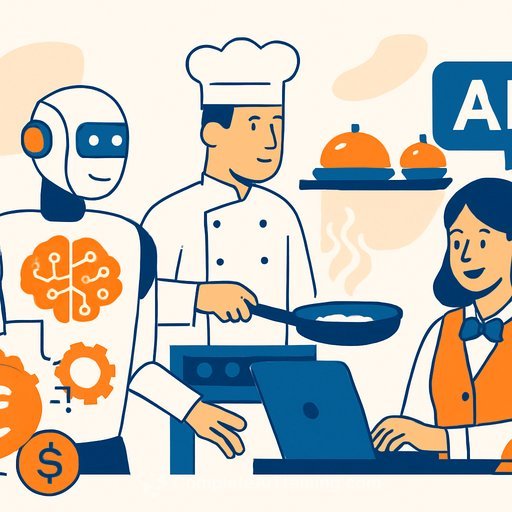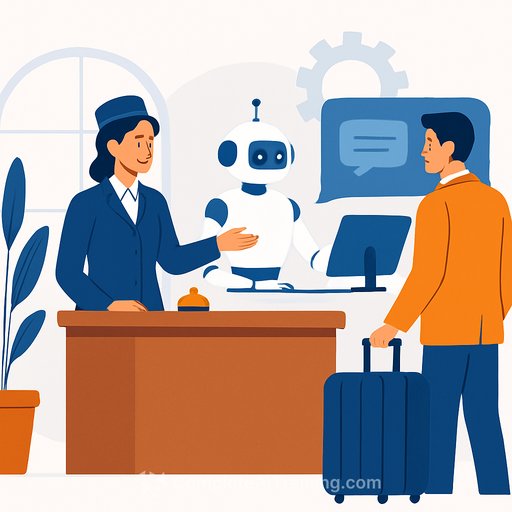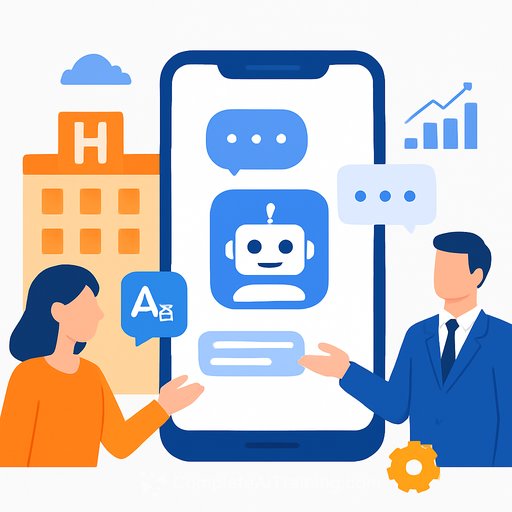Top 5 Hospitality Jobs in Sweden Most at Risk from AI - And How to Adapt
Last Updated: September 14th 2025
TL;DR
Five roles in Sweden face the most AI pressure: front-desk reception, reservation agents, concierge services, back-office admins, and entry-level F&B cashiers. About 41% of hotels report using AI, with reported gains such as guest satisfaction up to +25%, front-desk inquiries down -40%, and cost savings up to -30%. Routine touchpoints like check-ins, bookings, and basic concierge tasks are moving to chatbots, kiosks, and virtual concierges. The upside: automation can remove repetitive work so teams focus on high-value, human moments-if reskilling is built into the plan.
Table of Contents
- Methodology - How we identified the top 5 jobs
- Front-desk Reception Staff - Why reception roles are at risk and how to adapt
- Reservation and Booking Agents - Risk from automated booking & how to reskill
- Concierge Guest Services - Virtual concierges and the path to experience curation
- Back-office Administrative Staff - Automation risk and new higher-value roles
- Entry-level F&B Order-takers and Cashiers - From kiosks to multi-skilled roles
- Conclusion - Practical next steps for workers and employers in Sweden
- Frequently Asked Questions
Methodology - How we identified the top 5 jobs
We combined task-level exposure scoring (LMI 1-10 scale) with adoption factors and real-world constraints in Sweden. High routine density, lower upgrade paths, and strong economic incentives raised a role's risk score. We then adjusted for GDPR, biometric consent, IoT/predictive-maintenance use cases, and what research on task shift shows: automation can remove chores and amplify expert work.
As David Autor has been summarized: "Exposure is not a very useful term. Is it the case that if you're exposed, you're hosed?" The short answer: no. Jobs evolve based on what gets automated and what humans do next.
Front-desk Reception Staff - Why the role is at risk and how to adapt
Check-ins, payments, ID checks, and reservation lookups are now handled by kiosks and chatbots. In Sweden, this touches sensitive areas: GDPR, the Swedish Data Protection Act, and the Camera Surveillance Act if biometrics or CCTV are involved. Automation here must be privacy-literate by design.
How to adapt: shift reception from transaction to curation. Become the expert in exception handling, consent explanations (including Article 22 automated decisions), DPIA-trigger triage, and micro-moments that matter. Train teams on privacy notices, data subject requests, and clear handoffs from kiosk to human. As Sweden's privacy authority noted, smaller firms often need more training-close that gap with repeatable SOPs.
"A year into it, in 2019, we observed that organisations in general had procedures and routines in place to comply with the GDPR … however, we could also see some deficiencies, in particular within smaller companies, and we noted the need for more training, guidance and awareness-raising around the new rules." - Elisabeth Jilderyd, Swedish Authority for Privacy Protection (IMY)
Reservation and Booking Agents - Risk from automated booking & how to reskill
AI agents can compare options, quote prices, and complete bookings in seconds. Guests want relevant results, and the conversion path is shifting. Routine tasks (availability checks, simple upsells, channel juggling) are the first to be automated.
How to adapt: move upstream into revenue and data. Feed AI with clean inventory, structured FAQs, and PMS/CRM integrations. Learn dynamic pricing and segmentation, and act as the guardian of consented guest profiles. Keep the human edge: translate quirky requests into tailored packages and timing that retain guests for life.
Concierge Guest Services - Virtual concierges and the path to experience curation
Virtual concierges now handle multilingual FAQs, routine bookings, and service requests. This reduces friction and frees staff to craft local experiences, manage complex itineraries, and handle late-night exceptions without delay. Case examples abroad include Hilton's concierge robot "Connie," and in Sweden, AI-driven staff training efforts are already live at scale.
How to adapt: build data-driven curation skills, manage consented profiles, and design standout moments AI can't deliver. Integrate the concierge bot with PMS/POS to lift upsells and satisfaction, with explicit consent flows and secure connections.
- Guest satisfaction: up to +25%
- Ancillary revenue: +23%
- Front-desk inquiries: -40%
- Direct bookings: up to +25%
- Operational cost savings: up to -30%
Back-office Administrative Staff - Automation risk and new higher-value roles
Payroll, invoicing, scheduling, and data entry are predictable and ripe for automation. But Swedish employment rules matter. The Agency Work Act's 24-month threshold and LAS reforms shape how employers plan substitutions and conversions.
How to adapt: redeploy staff into compliance oversight, payroll QA, vendor and inventory analytics, and AI-ops. Use the 24-month rule as a planning signal, not a surprise. Pair tooling rollouts with funded retraining so the admin bench becomes your data accuracy, audit, and automation quality team.
Entry-level F&B Order-takers and Cashiers - From kiosks to multi-skilled hospitality roles
Kiosks and self-service apps cut lines and error rates. If handled poorly, this simply removes entry-level jobs. If handled well, it upgrades them. Involve staff early and coordinate with unions to redesign roles and schedules.
How to adapt: multi-skill teams across order prep, allergen management, guest data consent, kiosk oversight, and upsell coaching. Keep deployment compliant with GDPR and biometric consent rules. The win: a kiosk hums through orders while a trained team member turns a tricky allergy request into a loyal regular.
Adoption snapshot in Sweden
Across Europe, adoption is uneven-about 41% of surveyed hotels report using some AI while many still test or hesitate. Sweden's hospitality sector is already experimenting-from virtual concierges to AI-supported staff training. The operators that win treat AI as a shop-floor strategy with clear KPIs and reskilling baked in.
Conclusion - Practical next steps for Swedish hospitality
- Run a task audit: highlight check-ins, bookings, and POS as first-wave targets.
- Pilot small, GDPR-aware projects: kiosks at low-risk hours, chatbot triage after 10 p.m.
- Pair each pilot with reskilling: privacy literacy, RMS basics, prompt/tool ops, data stewardship.
- Track three KPIs: guest satisfaction, direct conversion, and redeployment rate.
- Use national resources and testbeds to deploy responsibly and interoperably.
"Based on who we are, our values, and our strengths, Sweden has a tremendous opportunity to solve key societal, democratic, and business challenges with the use of AI. To get there we should focus on generating value, leading with boldness, scaling collaboration, and investing significantly across sectors." - Martin Svensson, Managing Director at AI Sweden
Helpful resources: IMY for GDPR guidance (imy.se) and AI Sweden for national AI initiatives (ai.se).
If your team needs a practical learning path into AI-ops, revenue tooling, or data stewardship, see curated programs by job role here: Complete AI Training - Courses by Job. For structured credentials that signal readiness for automation projects, explore: AI Certification for AI Automation.
Frequently Asked Questions
Which five hospitality jobs in Sweden are most at risk from AI?
The most exposed roles are: 1) front-desk reception staff, 2) reservation and booking agents, 3) concierge guest services, 4) back-office administrative staff, and 5) entry-level F&B order-takers and cashiers.
How were the top-5 at-risk roles identified?
We blended LMI task-exposure scoring with adoption factors (cost, regulation, public acceptance) and task-shift logic. Sweden-specific constraints like GDPR, biometric consent, and IoT/predictive maintenance were used to adjust scores. High routine density plus limited upgrade paths raised displacement risk-but exposure is not destiny.
What legal and regulatory issues must Swedish hotels and restaurants consider?
Key areas: GDPR duties (data minimisation, consent, Data Subject Rights, DPIAs), Article 22 risks for fully automated decisions, the Swedish Data Protection Act, and the Camera Surveillance Act when using CCTV or biometrics. Labour law matters too: the Agency Work Act's 24-month rule and LAS reforms. Build consent flows, document DPIAs, secure integrations, and plan workforce transitions.
How can workers and employers adapt to reduce displacement risk?
- Reskill into higher-value roles: privacy-literate guest experience, data stewardship, RMS operations, prompt/tool ops, AI-ops.
- Redesign tasks: humans handle exceptions, curated experiences, VIP service; AI handles routine.
- Multi-skill entry-level teams across prep, allergens, kiosk oversight, and upsell coaching.
- Combine pilots with training and use Sweden's retraining supports and union input for fair transitions.
What pilots and KPIs help deploy AI responsibly?
Start with a task audit, run GDPR-aware pilots, and tie each to reskilling. Measure guest satisfaction, direct conversion on owned channels, and staff redeployment rate. Benchmarks from deployments report: guest satisfaction up to +25%, ancillary revenue +23%, front-desk inquiries -40%, direct bookings up to +25%, and cost savings up to -30% for well-integrated systems.
Your membership also unlocks:






